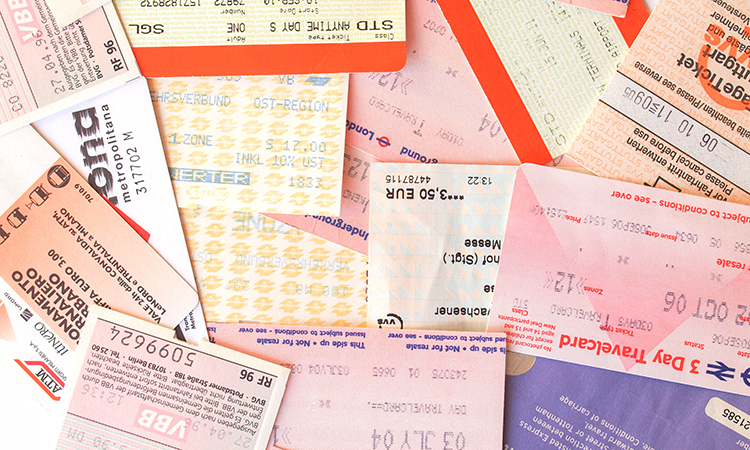Addressing the environmental impact of ticketing
- Like
- Digg
- Del
- Tumblr
- VKontakte
- Buffer
- Love This
- Odnoklassniki
- Meneame
- Blogger
- Amazon
- Yahoo Mail
- Gmail
- AOL
- Newsvine
- HackerNews
- Evernote
- MySpace
- Mail.ru
- Viadeo
- Line
- Comments
- Yummly
- SMS
- Viber
- Telegram
- Subscribe
- Skype
- Facebook Messenger
- Kakao
- LiveJournal
- Yammer
- Edgar
- Fintel
- Mix
- Instapaper
- Copy Link
Posted: 6 April 2023 | Philippe Vappereau - Calypso Networks Association | No comments yet
For the second instalment in an online-exclusive series published in partnership with Calypso Networks Association (CNA), Philippe Vappereau, General Manager at CNA, discusses the role that ticketing can play in addressing key environmental concerns and promoting sustainable practices in the transport industry, as well as why it is crucial for the sector to adapt and take action towards a more sustainable future, as the world becomes more aware of the impact of climate change.


“Everyone wants to get back to nature. But no-one on foot,” said German writer Werner Mitsch. This is the situation that the transport ecosystem finds itself in today. The industry is perhaps more aware than most of the environmental impacts in the everyday decisions that it makes, and the potential for public transport use to become an easy way for individuals to significantly reduce their carbon footprint.
The approach that public transport operators and authorities take to sustainable ticketing can play a major role in how public transport is viewed and used by the customer”
Governments around the world are now taking action to encourage the widespread use of environmentally friendly public transport. French authorities are implementing a ban on short haul flights where there is a reliable rail connection to reduce emissions. Meanwhile, the Welsh government is cancelling many of its high-profile road building schemes in an effort to reduce private vehicle usage and encourage the use of existing public transport links.
These governmental measures aim to drive important behavioural change. But they need support from the wider transport community. The approach that public transport operators (PTOs) and authorities (PTAs) take to sustainable ticketing can play a major role in how public transport is viewed and used by the customer. Indeed, the very tickets themselves can also be re-imagined in an environmentally conscious way.
Eliminating disposable tickets
Perhaps the most visible way that public transport operators and authorities can reduce their own carbon footprint is by reducing the need to issue physical tickets. Traditionally, passengers have been given a physical ticket as proof of payment, which networks can then check to validate a passenger’s right to travel. However, producing these tickets, be they paper or plastic, produces a vast amount of avoidable waste.
It is no longer sustainable for networks – especially those in major cities that provide mobility to millions of passengers every day – to distribute a single use ticket for every journey”
Operators and authorities must therefore re-assess how they issue tickets. It is no longer sustainable for networks – especially those in major cities that provide mobility to millions of passengers every day – to distribute a single use ticket for every journey.
Furthermore, the chip shortage resulting from decreased production during the pandemic continues to affect multiple industries worldwide. Public transport is no exception. Reducing the number of chips required, by reducing the number of disposable tickets produced, will help networks to ensure that their ticketing system is not at the mercy of this global shortage.
Dematerialisation must therefore be a priority.
By issuing smartcards that can be re-used multiple times, operators and authorities can continue to give passengers a physical ticket to validate their right to ride, but this can then be topped up and re-used for another journey, rather than discarded immediately.
Another way to eliminate single use tickets is by introducing mobile ticketing. However, this too comes with challenges that must be addressed.
Migrating to digital ticketing
Mobile ticketing, or mTicketing, can help to alleviate the pressures of issuing tickets to passengers by allowing them to purchase, store and use tickets from smart devices that they already own. In doing so, they eliminate the need for additional paper, plastic or chips to be used.
Mobile ticketing can help to alleviate the pressures of issuing tickets to passengers… In doing so, they eliminate the need for additional paper, plastic or chips to be used”
However, when implementing such solutions, it is important to keep in mind that not all passengers have access to or are willing to use their own device for ticketing. It also risks potentially excluding unbanked passengers if there is no alternative way to purchase or top-up their mTicket beyond connecting a bank card to the device. Operators and authorities must offer a full range of accessible ticket options to ensure that no-one is excluded from using public transport because of a lack of choice being available.
Creating new ticketing solutions
The fact is, no matter their environmental concerns, people must believe public transport to be the most appealing option for mobility. Implementing a system that makes it simple, reliable and affordable to use public transport can go a long way in encouraging travellers to leave their car at home.
We must avoid oversimplifying ticketing, and create a solution that offers flexible fares to match the less predictable travelling patterns that have followed the pandemic. The key to creating solutions that entice users away from private vehicles will be embracing Mobility-as-a-Service (MaaS).
Networks must consider how they can offer a joined-up, seamless ticketing experience, integrating established public transport with newer, flexible and more individual forms of mobility”
Traditional conceptions of public transport have focused on the passenger journey from transit stop to transit stop. MaaS has the potential to shape the future of urban transport by also supporting the first and last steps of every passenger journey. To meet these needs, networks must consider how they can offer a joined-up, seamless ticketing experience, integrating established public transport with newer, flexible and more individual forms of mobility, such as bikes and scooters.
This ambition for MaaS ticketing will only be achieved if systems are well designed, highly scalable and free from proprietary technology vendors. Open standards can support MaaS network growth beyond individual city limits, reaching national and even international scale, facilitating cross-border ticketing and fare integration. Be it through mTicketing or smartcards, creating such a dynamic, flexible ticketing system is a major challenge that will only be overcome through collaboration.
Getting back to nature
It is commonly accepted that no public transport operator or authority can exist without considering its own environmental impact. Paper tickets cause large amounts of waste and, although the global chip shortage is showing signs of easing, the high cost of materials means that we’re not ‘back to normal’ yet. Even mTicketing, which removes the need to issue physical tickets entirely, is not without its own environmental impact: the devices that tickets are stored on consume resources both in production and when they must be re-charged.
By building on open standards and integrating MaaS, public transport networks can introduce convenient door-to-door travel for passengers”
The good news is that operators and authorities are not powerless. Open standards provide them with ultimate control over their ticketing system, giving them the freedom to move to more sustainable ticketing without having to overcome the obstacle of vendor lock-in. Using this to reduce single-use tickets through re-usable smart cards or digital ticketing has the potential to cut millions of tonnes of waste each year.
At the end of the day, though, the biggest impact that operators and authorities can have on the environment is to help take more cars off of the road. Ticketing, backed by an efficient and reliable service, has the power to make public transport the most efficient and cost-effective way to travel. By building on open standards and integrating MaaS, public transport networks can introduce convenient door-to-door travel for passengers, helping us all to get back to nature, without being forced to travel on foot, or even in a private vehicle.
Read the first instalment in our online-exclusive series published in partnership with Calypso Networks Association on the importance of avoiding the oversimplification of ticketing here:


Related topics
Accessibility, COVID-19, Modal shift, Passenger Experience, Public Transport, Sustainable Urban Transport, Ticketing & Payments
Related organisations
Calypso Networks Association (CNA)
Related people
Philippe Vappereau








